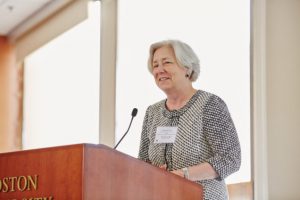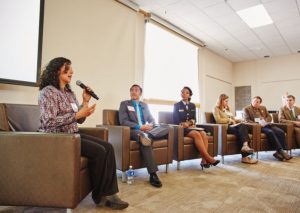Friday, September 23, 2016
Inspired by its unique position in one of the nation’s leading cities for health care, the Boston University School of Social Work Center for Innovation in Social Work and Health (CISWH) is a trans-disciplinary partnership working to expand the impact of social work in public health and other health disciplines. On May 12, CISWH faculty and affiliates welcomed nearly 200 attendees to the Boston University Medical Campus for a Symposium featuring the work taking place across seven learning communities.
“The social work profession plays a leading role in health,” said Dr. Sara S. Bachman, the Center’s interim director, who is now in the strategic planning process. “But that contribution has not been effectively measured. We want to explore the impact that social workers are making in many areas of health—including global and public health— and how the profession can strengthen and expand that impact.”
Endowed with generous support of $12.5 m from an anonymous donor, the CISWH is a unique collaboration among the Schools of Social Work, Public Health and Medicine at Boston University. Drawing on social work’s fundamental cross-disciplinary emphasis, the Center is engaging social work, public health, medicine, and other disciplines in cost-effective prevention and intervention that transform urban health care.
Spring Symposium Takes Place on May 12
At the heart of the Center are seven learning communities, each focused on particular areas of social work and health: aging & health equity, community health, global health, policy, health reform, behavioral health, and advancing social work education in health. Underscoring the CISWH’s trans-disciplinary approach, each community is co-led by faculty from the School of Social Work and the School of Public Health. Bachman has engaged over 75 regional, national, and global trans-disciplinary experts in the communities.
 During the Spring Symposium, leaders of each learning community presented their work through brief, interactive presentations. Topics spanned from the impact of a social work policy lens on population health to advancing social work education in health. Two panel discussions also took place, one moderated by Geoff Wilkinson (Clinical Associate Professor, BU School of Social Work) and another moderated by Harold Cox (Associate Dean for Public Health Practice, BU School of Public Health).
During the Spring Symposium, leaders of each learning community presented their work through brief, interactive presentations. Topics spanned from the impact of a social work policy lens on population health to advancing social work education in health. Two panel discussions also took place, one moderated by Geoff Wilkinson (Clinical Associate Professor, BU School of Social Work) and another moderated by Harold Cox (Associate Dean for Public Health Practice, BU School of Public Health).
Each learning community will author a peer-reviewed academic paper on social work and health. These papers will examine economic and social issues, prevention, collaboration, and social work’s current and future impact on population health. Findings from this research will form a supplement to be published by the American Journal of Public Health in late 2016.
In addition to this work, learning communities will also identify “shovel ready” projects—especially pilot studies and internship opportunities–that can be implemented immediately. The seven learning communities will also contribute to the Center’s longer-term strategic plan.
“People are starting to understand the value of social work in addressing health care challenges and improving outcomes,” said Dr. Gail Steketee, Dean of the Boston University School of Social Work. “By researching those contributions and how to expand their impact, we really are drawing attention to the profession and the critical role social workers serve in promoting the public’s health. It’s an exciting time.”
About the Center for Innovation in Social Work and Health
 The mission of the Boston University Center for Innovation in Social Work and Health (CISWH) is to expand the impact of social work in health, public health, and global health in order to reduce health costs, improve outcomes and the patient experience, and promote population health and health equity nationally and globally. The Center promotes social work leadership in health through inter-professional and trans-disciplinary collaboration with public health, medicine, health economics, technology and other relevant disciplines. The Center accomplishes its mission through outcomes-oriented research, community partnerships, policy development, and education and training activities.
The mission of the Boston University Center for Innovation in Social Work and Health (CISWH) is to expand the impact of social work in health, public health, and global health in order to reduce health costs, improve outcomes and the patient experience, and promote population health and health equity nationally and globally. The Center promotes social work leadership in health through inter-professional and trans-disciplinary collaboration with public health, medicine, health economics, technology and other relevant disciplines. The Center accomplishes its mission through outcomes-oriented research, community partnerships, policy development, and education and training activities.
The Center’s interim director is Sara (Sally) Bachman, who holds dual appointments at the School of Social Work and the School of Public Health. Madeline (Madi) Wachman, who earned a joint Master of Social Work/Master of Public Health from Boston University (SSW’14, SPH’15) is program manager.
To learn more about the Center’s work, contact Madi Wachman at [email protected] or at 617-638-5220.